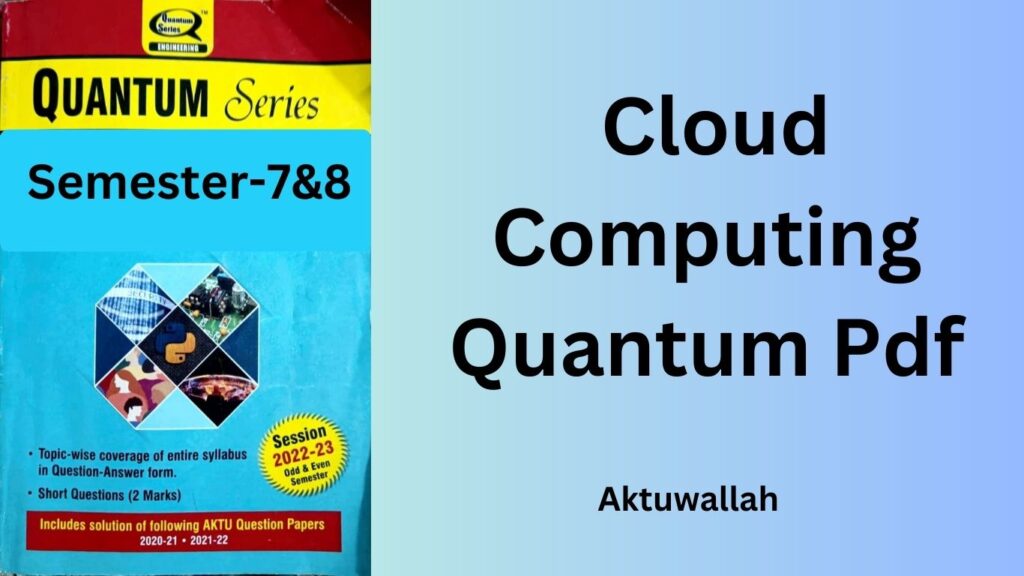Download Cloud Computing Quantum Pdf For Aktu B-tech Final Year:
Cloud computing has revolutionized the way businesses and individuals store, manage, and access data. With its scalability, flexibility, and cost-effectiveness, it has become an integral part of the IT landscape. For AKTU B-Tech final year students, having a comprehensive understanding of cloud computing and its key topics is crucial. In this article, we will explore the concept of cloud computing, its benefits, and the key topics that every AKTU B-Tech final year student should know. Additionally, we will provide you with a downloadable Cloud Computing Quantum Pdf that covers these topics in detail.
How to download the Cloud Computing Quantum Pdf for free?
Click at the given link.
GET PDF
Download other CS quantum pdf for Aktu B-tech final year: Click Here
Download Aktu Syllabus of CS B-tech 4th year: Click Here
Download Handwritten Notes of all subjects: Click Here
Download Cloud Computing PYQs: Click Here
Introduction to Cloud Computing Quantum Pdf
Cloud computing refers to the delivery of on-demand computing resources over the internet. Instead of relying on local servers or personal computers, cloud computing allows users to access and utilize powerful computing infrastructure and services provided by third-party providers. These resources include storage, databases, software, and networking capabilities.
Benefits of Cloud Computing Quantum Pdf
Cloud computing offers numerous benefits for businesses and individuals. Some of the key advantages include:
- Scalability: Cloud resources can be easily scaled up or down to meet the changing needs of users, ensuring optimal performance and cost efficiency.
- Flexibility: Users can access cloud services and data from anywhere with an internet connection, enabling remote work and collaboration.
- Cost-effectiveness: Cloud computing eliminates the need for upfront hardware investments and reduces operational costs by providing a pay-as-you-go pricing model.
- Reliability: Cloud providers offer robust infrastructure with high availability and data redundancy, ensuring minimal downtime and data loss.
- Security: Cloud platforms implement advanced security measures to protect data, including encryption, access controls, and regular backups.
Key Topics in Cloud Computing Quantum Pdf
Virtualization
Virtualization is a fundamental concept in cloud computing. It allows multiple virtual machines (VMs) to run on a single physical server, enabling efficient resource utilization and isolation between different workloads.
Infrastructure as a Service (IaaS)
IaaS provides users with virtualized computing resources such as virtual machines, storage, and networking infrastructure. Users have full control over the operating systems and applications running on the virtual machines.
Platform as a Service (PaaS)
PaaS offers a complete development and deployment environment in the cloud. It provides tools, frameworks, and services to facilitate the building, testing, and deployment of applications without the need to manage the underlying infrastructure.
Software as a Service (SaaS)
SaaS delivers software applications over the internet on a subscription basis. Users can access and use these applications without the need for installation or maintenance on their local devices.
Hybrid Cloud
Hybrid cloud combines public and private cloud infrastructure, allowing organizations to leverage the benefits of both. It provides greater flexibility and enables seamless migration of workloads between different environments.
Public Cloud
Public cloud refers to cloud services provided by third-party vendors and accessed over the public internet. It offers scalability, cost-effectiveness, and ease of use for businesses of all sizes.
Private Cloud
Private cloud is dedicated infrastructure solely used by a single organization. It provides enhanced security, control, and customization options but requires higher upfront investments.
Cloud Security
Cloud security focuses on protecting data, applications, and infrastructure in the cloud environment. It involves implementing robust security measures, such as encryption, access controls, and threat monitoring.
Big Data and Cloud Computing
Cloud computing plays a crucial role in managing and analyzing vast amounts of data. It provides the storage and computational resources required for processing big data efficiently.
Internet of Things (IoT) and Cloud Computing
The combination of IoT and cloud computing enables the collection, processing, and analysis of data from interconnected devices. Cloud platforms offer the scalability and data processing capabilities needed for IoT applications.
Artificial Intelligence (AI) and Cloud Computing
Cloud computing provides the computational power and storage required for AI applications. It allows organizations to leverage AI technologies without investing in expensive infrastructure.
Serverless Computing
Serverless computing abstracts away the server infrastructure, allowing developers to focus on writing code. It provides automatic scaling and reduced operational overhead.
Containerization
Containerization enables the packaging and deployment of applications in isolated environments called containers. It offers portability, scalability, and efficient resource utilization.
Cloud-Native Applications
Cloud-native applications are designed and built specifically for cloud environments. They leverage cloud services and follow modern software development practices such as microservices architecture and continuous deployment.
Cloud Migration Strategies
Cloud migration involves transferring applications, data, and infrastructure from on-premises environments to the cloud. Various migration strategies, such as the lift-and-shift approach or rearchitecting applications, are used to ensure a smooth transition.
Conclusion
Cloud computing has emerged as a game-changer in the field of IT. AKTU B-Tech final year students must grasp the core concepts and key topics related to cloud computing to stay ahead in their careers. By understanding virtualization, different cloud service models, security considerations, and emerging technologies like AI and IoT, students can harness the full potential of cloud computing. Download our short PDF to dive deeper into these topics and unlock the power of cloud computing.
LINK IS NOT AVAILABLE TO DOWNLOAD QUANTUM PDF OF CLOUD COMPUTING
see carefully